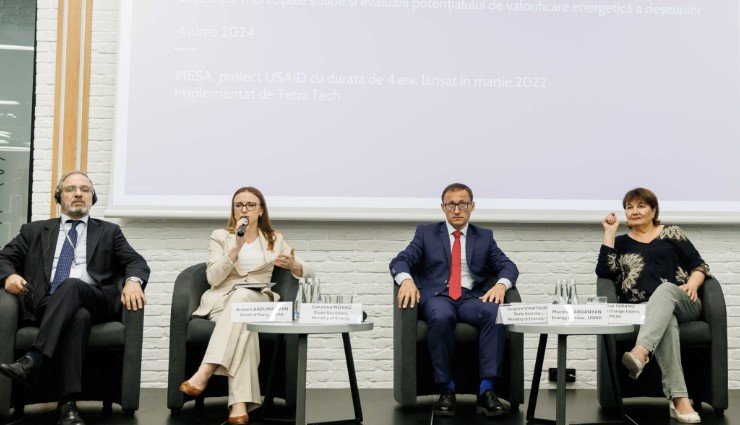On June 4, 2024, PMCG held a significant workshop at Digital Park in Chisinau, Moldova, to present the findings of their comprehensive study on the morphological composition of municipal solid waste and the potential for waste-to-energy (WTE) production. Funded by USAID, this initiative is part of the Moldova Energy Security Activity (MESA) led by Tetra Tech. The workshop gathered government officials, international financial institutions, sector experts, and other stakeholders to discuss the future of WTE in Moldova.
Transforming Waste into Energy
The study revealed that approximately 65% of the solid household waste generated in Chisinau and Balti, Moldova’s two largest cities, can be converted into energy. This includes materials such as food scraps, paper, cardboard, textiles, leather, and wood. The conversion of these materials into electrical and thermal energy presents a significant opportunity for Moldova to enhance its energy security and reduce its reliance on traditional energy sources.
The workshop highlighted the importance of adopting advanced technologies to efficiently convert waste into energy. Experts discussed various methods and technologies that could be implemented to maximize energy production from waste. The potential benefits of these technologies include not only energy generation but also a reduction in landfill use and greenhouse gas emissions.

Participants at the workshop emphasized the need for a strategic approach to waste management and energy production. They discussed the importance of policy support, public awareness, and investment in infrastructure to ensure the successful implementation of WTE projects. The collaboration between government agencies, private sector, and international partners was seen as crucial for the project’s success.
Strategic Recommendations for Stakeholders
The workshop provided a platform for stakeholders to share insights and recommendations for the future of WTE in Moldova. Policymakers were urged to create a supportive regulatory framework that encourages investment in WTE technologies. This includes providing incentives for businesses to invest in waste management and energy production infrastructure.
Government agencies were encouraged to develop comprehensive waste management plans that prioritize WTE projects. This involves identifying suitable locations for WTE facilities, ensuring proper waste segregation, and promoting recycling initiatives. The integration of WTE into the national energy strategy was also discussed as a key step towards achieving energy security.
Environmental and energy experts highlighted the need for continuous research and development in WTE technologies. They stressed the importance of staying updated with global advancements in the field and adapting them to Moldova’s specific context. Collaboration with international organizations and participation in global forums were recommended to keep pace with the latest trends and innovations.
Moving Forward with Waste-to-Energy
The workshop concluded with a call to action for all stakeholders to work together towards a sustainable future for Moldova. The findings of the study and the discussions at the workshop underscored the immense potential of WTE to address both waste management and energy challenges. By harnessing the energy potential of waste, Moldova can make significant strides towards a cleaner and more sustainable energy future.
The next steps involve translating the workshop’s recommendations into concrete actions. This includes developing pilot projects to demonstrate the feasibility of WTE technologies, securing funding for large-scale implementations, and fostering public-private partnerships. The success of these initiatives will depend on the collective efforts of all stakeholders involved.
The workshop marked a pivotal moment in Moldova’s journey towards sustainable waste management and energy production. With the right strategies and collaborations, Moldova can lead the way in transforming waste into a valuable resource, contributing to both environmental sustainability and energy security.
